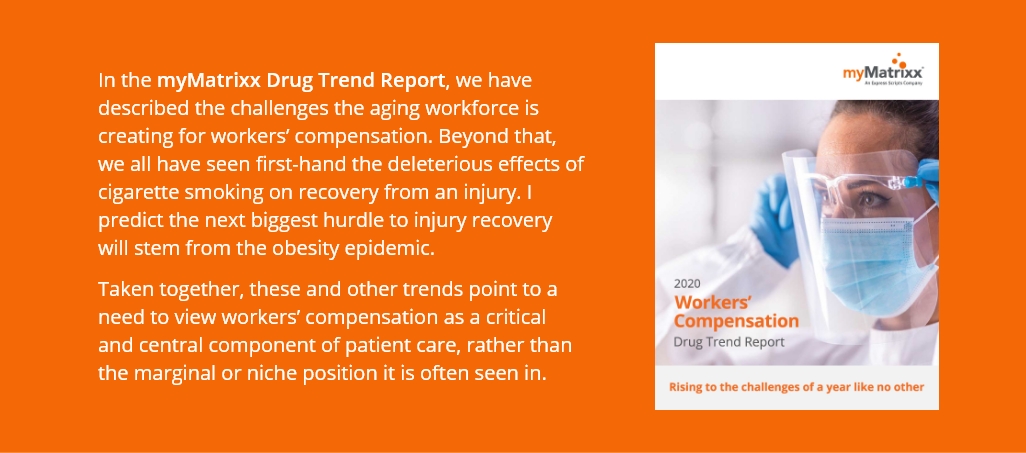Phil Walls, RPh
Chief Clinical Officer
Workers' compensation is often seen as a niche area in the larger health care field — and one that is sometimes perceived as being behind the curve. Furthermore, the attention in workers’ compensation has been focused on opioids for so long I thought it might be interesting to examine four cases where the workers’ compensation industry, specifically pharmacy management, forecasted and responded to other emergent issues before they impacted general health care.
1. Unnecessary Prescription Compounding
One crisis that appeared in workers’ compensation before it was observed in other areas of health care was the overuse of compounding, which primarily represented an unnecessary financial drain on the industry. With the advent of the D.0 telecommunications standard developed by the National Council for Prescription Drug Programs (NCPDP), prescriptions could be processed with multiple ingredients.
The compounding industry was not only able to begin billing for multiple ingredients, it also had an easier way to bill other entities, such as Medicare Part D and Tricare. When these other payer types recognized the egregious pricing of these unproven therapies, the Federal Bureau of Investigation, the Department of Justice, the United States Postal Service and other agencies quickly stepped in. This has led to many of the worst compounding offenders now facing jail sentences along with much-needed oversight.
2. Dangerous Drug Combinations
In August of 2016, the FDA released a black box warning, which is designed to call attention to serious or life-threatening events, regarding the concomitant use of opioids and benzodiazepines:
“FDA is warning patients and their caregivers about the serious risks of taking opioids along with benzodiazepines or other central nervous system (CNS) depressant medicines, including alcohol. Serious risks include unusual dizziness or lightheadedness, extreme sleepiness, slowed or difficult breathing, coma, and death. These risks result because both opioids and benzodiazepines impact the CNS, which controls most of the functions of the brain and body.”
However, just last month I read the headline “Opioid-benzo Combination Eyed by Payors,” in the May/June 2021 edition of Specialty Pharmacy Continuum, Volume 10, Number 3.
Almost five years after the FDA release and the myMatrixx response to that warning, other areas of health care have begun to recognize the dangers of this combination and take action. Interestingly, the article pointed out that benzodiazepine taper needs to be slow. Otherwise, depending on dose and length of therapy, a patient may experience seizures on withdrawal. Therefore, there is no outright denial of the prior authorization request. Although this is atypical in group healthcare, it is exactly what we encounter in workers’ compensation.
3. Injured Worker “Quarantine” — Isolation and Mental Health
Throughout my career I have been aware of the isolation faced by injured workers who experienced severe and catastrophic injuries. During 2020, the entire nation observed the mental health aspect of isolation brought about by the COVID-19 pandemic and subsequent quarantine. Soon after, I observed that many injured workers face the same isolation and the resulting negative impact to their mental health following a serious workplace accident.
This connection underscores the critical role that behavioral care plays in overall wellness and recovery from serious injury. There is a growing understanding that unaddressed mental health problems, including depression and anxiety and social factors, such as isolation, can have a negative impact on long-term patient outcomes. In workers’ compensation, a large number of patients have been facing these challenges in a pronounced and prolonged way compared to the rest of the population.
4. On the Horizon — Off-label Prescribing and Physician Dispensing
What’s next? I believe that workers’ compensation is currently experiencing existing or rising crises that may soon impact the rest of the population. The first of these is the off-label, and often inappropriate, use of buprenorphine outside of medication-assisted treatment for opioid use disorder. This has already been a rising concern for workers’ compensation, and the quarantine has led to the relaxation of certain laws regarding the use of buprenorphine, which is now creating the same concern for other payer types.
The second crisis that I believe should create concern for other payer types is physician dispensing. To date, this has been a unique problem in workers’ compensation simply because injured workers do not have out-of-pocket expenses. I predict that it is just a short period of time before the entities involved in physician dispensing bridge the technology gap that prevents a physician from adjudicating prescriptions through other payer types.



